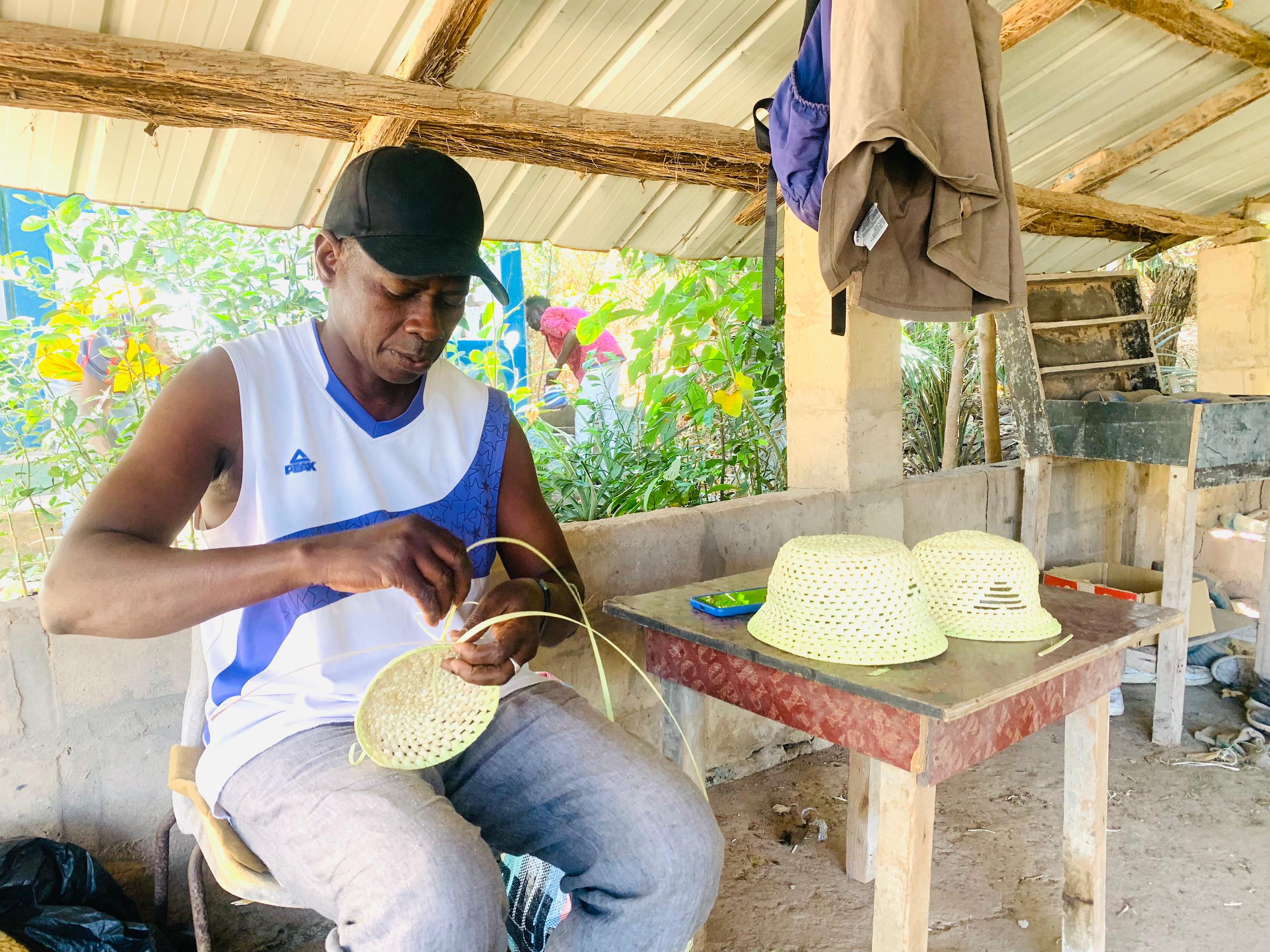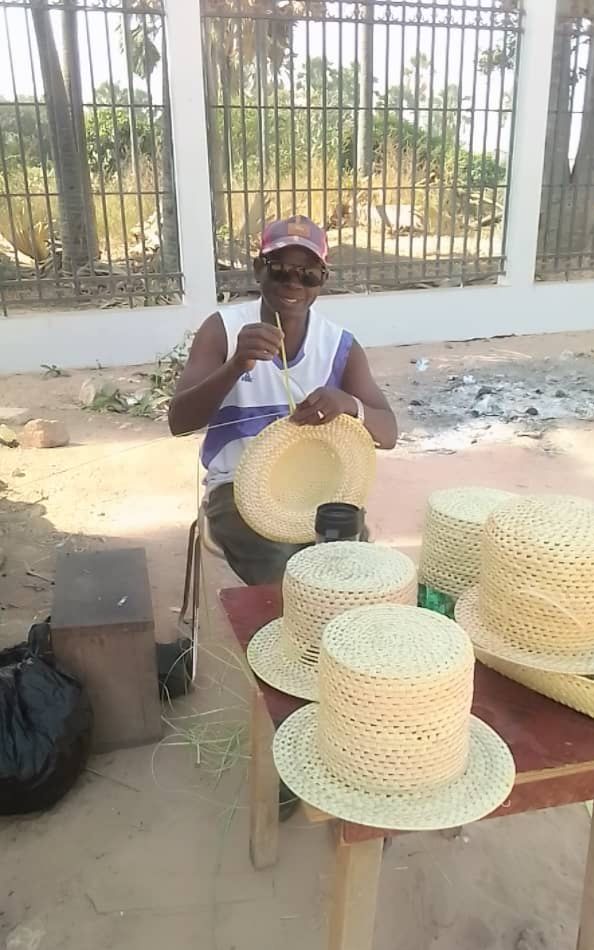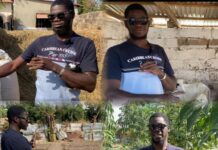By Sainabou Sambou
Sorrie Camara, a skilled Gambian weaver, has transformed the dried leaves of the Palmyra palm tree into an array of beautiful, handcrafted products. His creations, which include handbags, sling bags, baskets, table mats, customized local hats, bottle holders, and birdhouses, reflect a rich tradition of craftsmanship.
Camara’s journey back to his roots began after a decade-long stay in Germany and ended abruptly in 2015 when he was deported to The Gambia. Arriving with limited financial resources, he used his weaving skills to rebuild his life. He breathed new life into a traditional craft that has been waning in popularity amid modernization in The Gambia.
His story is emblematic of the experiences faced by many Gambian migrants who seek improved prospects overseas. A 2023 World Bank report highlights The Gambia’s economic challenges, notably a 41% youth unemployment rate, which drives many young Gambians to pursue opportunities abroad. Germany has emerged as a significant destination in this migratory trend.
However, the path is fraught with challenges. Eurostat data reveals that only about 4% of Gambian asylum seekers in Germany are granted refugee status, leaving many in precarious legal situations and living under the constant threat of deportation. This situation often limits their access to employment and social services.
Despite these challenges, Sorrie Camara’s story is one of resilience and adaptation. By revitalizing his weaving trade, he supports himself and preserves a cultural heritage, offering a beacon of hope and self-reliance for those facing similar circumstances.
A 2023 report from the German Federal Office for Migration and Refugees revealed that nearly 2,000 Gambians were deported from Germany between 2018 and 2023 under stricter immigration policies. Sorrie Camara was among those affected, facing the challenge of reintegrating into Gambian society with minimal support upon his return.
Before his migration, Mr. Camara worked as an assistant meteorologist at the Department of Water Resources for 11 years. His journey to Germany began as a one-month holiday, but after connecting with other African migrants, he decided to apply for asylum.
“During my 10 years in Germany, I didn’t have legal documents. I was told that having a wife and child there could help secure my status, but I still wasn’t granted any papers,” he recounted.
As outlined in a report on German Asylum Policy, Germany’s asylum policies present challenges for economic migrants seeking legal status unless they meet specific criteria, such as escaping war or persecution. This has resulted in many migrants, including Sorrie, being unable to legalize their stay despite lengthy periods in the country.
Sorrie’s request to renew his asylum status was eventually denied, culminating in his deportation. His lawyer later informed him that he was prohibited from returning for two years. Despite the expiration of this ban, his subsequent visa applications have been rejected.
After his deportation, Sorrie Camara returned to his roots, utilizing his skills in traditional weaving with palmyra palm leaves. The palmyra tree is highly valued in West Africa for its versatility, particularly in creating eco-friendly products like baskets, furniture, and various crafts.

While in McCarthy, Sorrie encountered an experienced weaver who taught him how to craft hats, bags, and baskets from Palmyra leaves. After several months of training, he launched his own business.
“My business is going well. Most of my customers are tourists, but Gambians also buy from me. I supply local hotels, the Senegambia Craft Market, and other craft vendors,” he explained.
The Global Handicrafts Market Report indicates a growing global demand for crafts made from natural materials, such as palmyra leaves, due to a surge in eco-friendly fashion trends. This increase in interest has made traditional weaving a potentially profitable artisan industry.
Despite his business’s success, Sorrie faces financial challenges. His daily earnings range between D500 and D1,000, with his products priced between D250 and D700. During the tourism season, he can make between D10,000 and D18,000 per month, but his income drops to D7,000 or less in the off-season.
One of his significant challenges is the lack of a permanent shop. He currently operates from the backyard of the Sir Dawda Kairaba Jawara International Conference Center, a government-owned space. If the government decides to develop this area, he risks losing his workspace.
“I hope to get support to open my shop where I can create and sell my products while training young people,” he expressed.
Before his deportation, Sorrie aspired to study architecture in Germany, but those plans were halted. Now, he is focused on expanding his business in The Gambia.
Investing in skills training for returnees could be an effective strategy to reduce re-migration. According to a study by the Gambia Bureau of Statistics, 67% of deported migrants face difficulties reintegrating economically. Nonetheless, returnee programs that focus on supporting sectors like agriculture, crafts, and entrepreneurship have shown success in helping migrants establish themselves in their home countries.
Despite these challenges, Sorrie remains optimistic. His experience illustrates resilience and demonstrates that it is possible to create opportunities at home, even after deportation.





